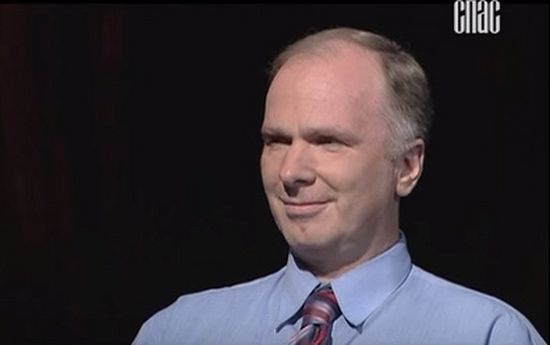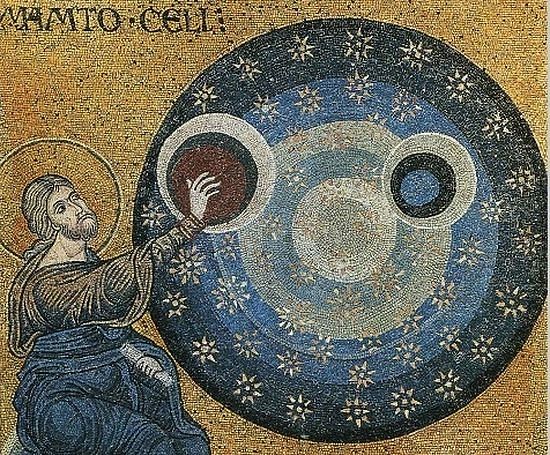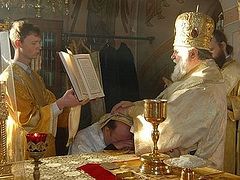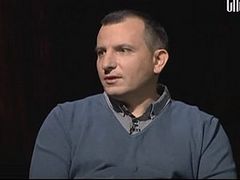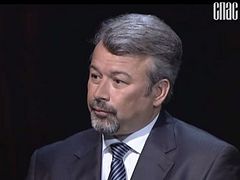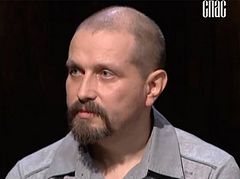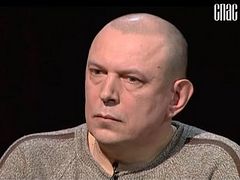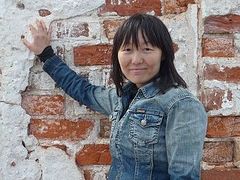We continue to publish the materials of Spas TV program “My Path to God,” where Priest George Maximov interviews people who have converted to Orthodoxy. Despite his rationalist/ evolutionist background, physicist Andrey Vetchinkin was acutely unhappy with the scientific basis of the theory of evolution. He converted to Orthodoxy after encountering phenomena that could not be explained or understood by his usual rationalistic approach. In this interview, we will discuss feelings and rationalization, and consider the reality of evil spirits and the tricks they employ. We will also learn how carbon can help disprove the theory of evolution and why scientists obstinately continue to support the indisputability of this theory even though they know it is hypothetical in nature.
Priest George Maximov: Hello! You are watching My Path to God. The guest of today’s program is senior researcher Andrey Sergeeyvich Vetchinkin, candidate of physical and mathematical sciences. Please tell us how your spiritual journey began.
Andrey Vetchinkin: Everything started in childhood, of course. I was born into a well-established family of natural scientists in Moscow, who believed that faith was a personal matter and science today could explain practically everything. They believed that it was necessary for previous generations to express their intuitive experiences through philosophical or religious concepts simply because, thousands of years ago, there was no other way of understanding such experiences. I was taught that today’s science could easily explain the things that, in the past, people could understand only vaguely or intuitively. For example, the Hexaemeron described in the beginning of the Bible says that first God created light. The big bang theory also posits that immediately after the singularity point there was light; this is how it was explained to me. However, deep down, I had a certain uneasy feeling that I was missing the most important thing and that I had to find the truth in order to avoid becoming a failure and suffering the consequences later.
About the time I was in the sixth grade, I began searching for the origin of everything. I had my grandfather’s Bible in Church Slavonic and tried reading it from the very beginning. I read chapters 1 to 10 of the Book of Genesis. When I finished, I understood that everything described therein contradicted the scientific teachings. You can try to make up some explanations, but the fact remains that the Hexaemeron absolutely does not fit the scientific paradigm that had been quite established by the end of the 1970s. First of all, it is the matter of the six days. If it is written “days,” it means “days.” Secondly, according to the Bible, the world is 7,500 years old, maybe a bit more. Everything is written very clearly.
Father George: Things like the creation of celestial bodies after the development of vegetation, the creation of the Earth before the creation of the Sun…
Andrey Vetchinkin: The most important thing was that it stated that first God created the sky and earth, then the light, and, after that, the stars. However, as I was taught at that time, everything happened in the reverse order. That is, it began with nebulae that formed the stars. Then, stars erupted, heavy elements within them exploded, and their ashes formed second-generation stars containing heavy elements, such as iron. The Earth was formed from protoplanetary clouds surrounding the stars and later developed the possibility for life. This started 4.5 billion years ago and lasted for hundreds of millions of years. So, I put the Bible back on the shelf. In contrast, everything was quite fine with the scientific approach—I mean that it possessed no contradictions. Of course, there were some things that science couldn’t explain.
Father George: What things, specifically?
Science explained a lot of things, but it did not specify what was good.
Andrey Vetchinkin: What is good? How should we behave with other people? There were big issues to consider. That is why, when I was admitted to the Moscow University, I was very interested in psychology on the one hand, and the history of religion and atheism on the other. In my fourth year of studies at the university, my favorite subject was Scientific Atheism. I passed very detailed exams and even wrote a paper on that subject. I thought that just a little bit more of practical psychology studies would clarify everything for me. At that time, in the late 1980s, many various psychological clubs were formed.
I was attending a club called Sinton. Later, the club turned to the occult, but at that time it was simply following the traditions of humanistic psychology based on very rational explanations for everything in this world. Members of the club believed that emotions were something that existed within ourselves and, if we disregarded them and looked at them as if from afar, then we would be able to act rationally and independently from our emotional states. In other words, they believed that you can detach yourself from your emotions—which, by the way, I could do quite well after some training. It turned out that people could act rationally. Ultimately, their feelings were not very important.
I didn’t trust any feelings, as I was sure that any feeling could be objectively wrong, once you tested it.
I didn’t trust any feelings, which is understandable for a scientist. For example, this is a cup with tea in it. You can touch it and feel that it is warm. What is warmth? We know that it is the movement of the molecules of liquid, but intuitively we feel that warmth is a special substance—they used to call heat “caloric.” Similarly, intuitive perception of any feeling from my personal experience could be objectively wrong, when you test it—just as it happened with “caloric.” Naturally, that was why I couldn’t trust any feelings—so I didn’t. That is why I was not impressed by any occult sects or popular culture. I still have no interest in them whatsoever.
Father George: Did the same thing happen with religion?
Andre Vetchinkin: Yes. For example, I come to an Orthodox church, I know the history of religion, I know the layout of the church, and I feel warm and good. However, there are many places where I can feel warm and good. When I come home and sit down by the heater, I feel warm and good too. Since feelings could not be sufficient grounds for taking serious actions, I lived based on a strictly rational approach.
However, that old uneasy feeling was still there, and I realized that I still didn’t understand the most important thing in life. That uneasiness bothered me and demanded resolution. Okay, let’s see, then. Maybe I didn’t understand what good and evil were? At that time (mid-1990s), I liked the branch of evolutionist theory that was popular in England from the late nineteenth through the early twentieth-century. According to this branch, the morality that was formed over the historical period was sufficient in the past, but that morality was no longer appropriate because society had changed and had become much more civilized. The philosophers suggested that slight modifications should be introduced to the concepts of good and evil, making them laxer and more flexible, and all would be well. Spenser and Moore more or less helped to formulate what was good and what was evil.
Father George: From the point of view of this philosophy?
I prayed to God, asking Him to show me the Truth with sufficient justification that would not be based on feelings.
Andrey Vetchinkin: Yes. In short, good is what is useful for life. If life is something that evolves and becomes more complicated, and you do the same, so that life flourishes, becoming more interesting and more complex—that is good. If what you are doing follows the opposite course—that is evil. This approach worked more or less until I ran into serious situations. Then I would become overwhelmed again by feelings and this approach no longer worked in the real world. However, even at times when everything seemed to be fine, that feeling of dissatisfaction still lingered on. Naturally, I formulated everything for myself pretty well, but something still bothered me and I felt that I was doing something wrong. I then turned to the Creator with a prayer, saying: “God, if you are there, make it so that I understand that there is Truth, that this Truth is with You, and that this Truth has sufficient explanation.” That is, the Truth that is not based on the feelings.
Father George: You mentioned situations where the atheistic and rationalistic view of the world would fail. Can you give an example?
Andrey Vetchinkin: I got married in the early 2000s. Somehow, our apartment became infested with some entities. At first, they weren’t very noticeable, but after a while they began to manifest themselves more and more. Not only were they visible, they also made it so that I could talk to them, just as I’m talking to you right now. That is, they weren’t in the form of some thoughts that came to my mind, information was being transmitted through physical sound waves—something you could hear with your ears and record on a voice recorder.
Father George: Do you mean evil spirits?
The experience is horrible, because demons are not people. They are extremely clever and inhumanely malevolent.
Andrey Vetchinkin: Yes. I knew that there were such things as evil spirits and had read about such occurrences, but when I actually encountered them, I realized that the books poorly described this experience. The experience is horrible because demons are not people. These ancient fallen angels are extremely clever and inhumanely malevolent.
Father George: Many secular-minded people, when they encounter demon-possessed people, or hear about them, say, “Well, this is just a manifestation of their mental disorder.”
Andrey Vetchinkin: Exactly. I thought the same. However, I studied psychology and knew what neurasthenia and epilepsy were. Mentally ill people cannot give information that they do not possess. For example, they cannot give information about people completely unknown to them, things that are beyond the scope of their education, or the structure of another world (in this case, the structure of hell). Ultimately, these evil spirits had a very specific goal—to break up our family.
Of course, I immediately understood where I had been wrong; I had received the answer to my prayer. I was baptised and churched. We began going to specialists to learn how to fight the evil spirits. Naturally, I stopped talking to the evil spirits, but, before that, I did get some information from them. I even asked them about their opinions on other Christian confessions, when I had the chance to do so. They told me, “The Orthodox church is the only one we fear.” I asked, “What about Catholic churches?” (we used to pass by a Catholic church). "Catholics are not really in our way, they can’t do anything to us evil spirits,” they replied.
That is how I became an Orthodox Christian. Still, the problem of the Hexaemeron remained.
Father George: Some people think that religion and science cannot contradict each other because they say the same thing. However, in the case of the Hexaemeron, religion and science say different things about the creation of our world.
Andrey Vetchinkin: Yes, there are areas where science and religion have different opinions on the same subject, so if they contradict each other, it must mean that one of them is wrong. I started reading the works of our famous creationists, Father Daniil Sysoyev, for example. Frankly, I wasn’t very happy with what I read. Not with the theological explanation—everything was fine there—but with that part where Father Daniil referred to Morris and other Protestant scientists who tried…
Father George: …to provide scientific confirmation.
Andrey Vetchinkin: Yes. I’m sorry, it was simply primitive. For example, it stated: because the distance between the Moon and the Earth increases by a meter each year, both would have moved quite far over the period of one billion years. However, there is such a thing as lunar libration (the oscillation of the Moon’s orbit) to consider. This is one example. I even went to see Father Daniil to talk about it, but we didn’t meet because he was busy. Later he passed away—in 2009. I continued my research on my own.
 Creation of Celestial Bodies. (Creation of the World, fragment) St. Mark’s Basilica, Venice, Italy. 13th century.
Creation of Celestial Bodies. (Creation of the World, fragment) St. Mark’s Basilica, Venice, Italy. 13th century. It helped that I did—and still do—study coal. Coal is basically petrified wood that has been subjected to pressure and high temperature. If you carefully examine a piece of coal, you can often see imprints of leaves, sometimes so detailed that you can even see the leaf nerves. According to science, coal was formed in the Carboniferous period 350-290 million years ago. I studied coal, burned it, and I know its structure…
Father George: Was this the subject of your scientific activity?
If coal was underground for 290 million years, not a single 14С radioactive atom should have remained.
Andrey Vetchinkin: Yes. So I decided to verify this. It is known that coal contains isotopes 12С and 14С. 12С is stable, while 14С is radioactive with a half-life of 5,730 years. In other words, after approximately 5,700 years, half of its atoms will transform into the atoms of another substance (nitrogen). Therefore, if this coal (this former piece of wood) was underground for 290 million years, then, over that period of time—even if there was a great quantity of coal—there would be no radioactive atom of 14С1 left in it. Research completed by Americans has demonstrated that approximately a hundred atoms of coal out of a million are radioactive2. So, if we assume that the concentration of radioactive СО2 in the distant past was the same as today, then the age of this coal is approximately 50,000 years. In fact, this result can change depending on the concentration of 14СO2 in the atmosphere in the distant past. We don’t know this value, so the age could be 5,500 years or 100,000 years, but it is important to note the order of magnitude. The age could be dozens of thousands of years at most. It cannot be measured in millions.
“Okay,” I thought. “Is there any other proof, other than coal? What if I’m wrong?” Scientific theory can be defended. One fact, even if it is an essential one, does not play the definitive role.
However, radioactive carbon is also present in dinosaur bones and in all fossils. Moreover, these dinosaur bones still contain traces of DNA and erythrocytes that should have disintegrated over millions of years.3 Now then, let’s assume that dinosaurs lived only thousands (rather than millions) of years ago. People should have seen them. Indeed, there are ancient drawings of dinosaurs. There is a temple in Cambodia with dinosaurs carved on the wall.4 We can also see their images carved on stones in Peru and Mexico.5 These stones were demonstrated at the exhibition held at the Darwin Museum. I went there and indeed saw the stones with images of dinosaurs and even of people flying on dinosaurs. I asked the museum attendant, “So then, it turns out that dinosaurs became extinct only two or three thousand years ago?” She replied, “So what? Evolution is the main thing.”
Strictly speaking, the evolutionary paradigm is not scientific. In terms of development of scientific hypotheses, it is a philosophical structure that is outside the realm of science. The strength of science is that it is based on things which are experimentally proven. Since events occurring 10,000 years ago cannot be experimentally proven, the evolutionary theory remains a hypothesis. However, sometimes science can refute such unprovable hypotheses, if their corollaries contradict the facts. In other words, the hypothesis that evolution occurred and that the Earth developed over the course of millions of years implies, for example, that there should not be any radioactive carbon in coal. But this is not true, so the hypothesis is wrong. Thus, even though science cannot prove such unprovable hypotheses, it sometimes can refute them. It is quite understandable for scientists: there are real hypotheses that cannot be proven, but can be refuted. The evolution hypothesis is one of them. Not everybody understands this, though. I have spoken with many scientists since I first understood this.
Father George: Many scientists take it very hard when somebody criticizes the theory of evolution…
Academician Ginsburg was sure that the evolutionary paradigm explained everything. However, if you look deeper, not everything is explained—for example, the Ice Age.
Andrey Vetchinkin: I prefer to speak to those who don’t take it so hard. Vitaly Lazarevich Ginsburg was the one who took it the hardest. He was an academician, a Nobel prize winner, and so on. I wasn’t Orthodox when I spoke with him, but nevertheless, one time (at a conference) we somehow began talking about pseudoscience. He was adamant that there could be no serious arguments against the theory of evolution. He believed that the evolutionary paradigm was systemic, comprehensive, solid, and explained everything. By the way, Vitaly Lazarevich contributed to the development of the paradigm himself. However, if you look deeper, not everything is explained—carbon dating, for example. There are quite a few examples such as that.
For example, there is the concept of the Ice Age that is a part of the evolutionary paradigm. According to this concept, 10,000 years ago, the glaciers were moving from Greenland toward the central part of Russia, and this left morainic ridges, boulders, etc. near Moscow. It has been calculated6 (as late as at the end of the nineteenth century) that, for a glacier to come down and carry these boulders, the height of the mountains should have been 11-15 km throughout Europe. Such heights do not exist! This theory, that the boulders were brought down by a glacier, was formed in Switzerland7. It works only if the glacier is coming down from very high mountains. Glaciers in Greenland and Antarctica do not carry anything. They simply fall into the sea, that’s all. As far as morainic ridges and boulders are concerned…well, boulders can also be found in Indonesia. Most likely, they were formed as a result of a large tsunami. Using such facts, you can openly talk to scientists, if you know them well.
Father George: And how do they take it?
Andrey Vetchinkin: Well, here we have a big problem, for if I talk to younger people, students or post-graduates, they begin to understand that there is not enough time for evolution, so the evolutionary theory is wrong. They are capable of understanding the truth. However, if people are in their late fifties to seventies, it is very difficult to overcome their skepticism. “Well, I don’t feel that there’s anything wrong with it,” they would say to me. “Of course,” I reply. “Your pride prevents you from seeing reason. Ask for the proof and you’ll surely feel that.” But they don’t want to ask.
Father George: Venerable Silouan of Athos used to say, “I recommend that unbelievers who want to believe should pray to God saying, “God, if you are there, reveal yourself to me, and I will serve you with my life.” Hearing such a humble prayer, God will definitely reveal Himself to such people. So, the Lord has brought you to do just this, even without the knowledge of these words of Venerable Silouan, and you found out firsthand that they were true.
Andrey Vetchinkin: No, I haven’t read the works of Silouan of Athos. However, if you want to believe, sooner or later you understand that you have to make a choice. The demons didn’t leave me alone. They said, “Orthodoxy is the true faith. So what? Now you will follow the will of God and tell people about the Truth—but most people won’t listen to you and won’t be saved. We will tell you what will happen to them.” They did tell me. If you think that hell is only about the pangs of conscience, you are wrong. The torments there are very real. “Anyway, why do you need this?” they went on. “We can give you power, money, or the ecstasy of highhandedness.” The ecstasy of highhandedness and moral decay is what demons use to attract prideful people. Many people do not want to know the Truth because they want to live according to their own will.
The demons kept on whispering to me, “Well, Orthodox people live according to the will of God, and their life is difficult, they get sick, and face other problems. Those who live according to their own will are enjoying themselves.” Indeed, if you don’t live according to God’s will, the demons will hardly get in your way, but if you overcome their influence by living according to God’s will, the demons will begin to work against you. Some of your attempts to achieve your goals will fail. You will have problems with your career. Generally, if you hit the demons hard, you will have many problems in your life.
Father George: Secular-minded people may say, “How is it worthwhile to confront the demons, if we will be deprived of opportunities?”
Demons despise and hate the people that willingly follow their orders.
Andrey Vetchinkin: Demons don’t like people—they seek to destroy them. Even if people worship them, they don’t like such people. Satanists are quite foolish if they think that by worshipping demons they could bribe, appease, or manage them. In fact, demons despise the people that willingly follow their orders. They hate such people.
Father George: Father Daniil Sysoyev, whom you mentioned earlier, explained that Satan is the source of hatred, so he hates those who are closer to him most. Therefore, he hates his devoted followers even more than he hates Christians.
Andrey Vetchinkin: In fact, it is better not to communicate with demons and to stay away from them. Their influence is usually manifested in passions and thoughts. As such, you need to be mindful of the thoughts that come to your mind.
Father George: Many people, including new Christians, fall for such a primitive demonic trap, when demons implant obscenities or disgusting thoughts in their minds. Such people get confused, thinking, “I never thought of anything like this, I had a very good upbringing. Where do such thoughts come from?” People start looking deeply within themselves and become confused. This confusion is the goal that demons desire to achieve. However, when we realize that not all thoughts that come to us are our own, and that the evil thoughts are not ours, then we don’t feel this confusion and the temptation is over.
Andrey Vetchinkin: This goes for people’s feelings, too.
Father George: That’s right—feelings, too. By the way, while we are discussing your encounter with the world of evil spirits, could you tell us if your turning to God helped your spouse, who was suffering from the demons?
Andrey Vetchinkin: Yes. We are still married and life is going on as usual. There is nothing particularly scary going on, just residual manifestations that are quite infrequent.
Father George: Let’s go back to discussing evolution. When you found this proof of the scientific inconsistency of evolutionary theory, did this change anything in your perception of faith?
Andrey Vetchinkin: Of course! It became simply unshakable, because, for me, everything is based on reason and objective experience, while feelings still don’t matter. In this light, my faith is so unshakable that I simply cannot imagine what could make me reject Christ. Naturally, as a result of all this, I became a more wholesome person and I felt that I became much stronger.
Father George: I know that there are people of science who come to religion, bringing with them evolutionary baggage that they don’t wish to leave behind. They say to themselves, “This is not an important issue, so we can place faith in this corner and evolution in the other corner and won’t allow them to collide.” Did you have a similar approach?
Andrey Vetchinkin: No. Modernism was never my thing. I remember a book called The Bible: Historical and Critical Analysis, written by a Soviet writer, Iosif Aaronovich Kryvelev. He liked to refer to Protestants and Modernist Catholics, especially when discussing the first chapters of the Book of Genesis. He wrote, “As you see, the religious concept is eroded on the way to modernization.” In Soviet times, this well-known atheist stated: “They will be wandering around there for a long time, but eventually they will come to complete faithlessness.”
Father George: As far as the Protestant world is concerned, our saints predicted this as well. St. Nicolas of Japan noted such tendencies as far back as the late nineteenth century, writing that Protestants would come to faithlessness. We do see this happening now. There are pastors who are officially stating that they do not believe in God, but at the same time demand that they should keep their jobs—and they do keep their jobs.8 This is considered normal now.
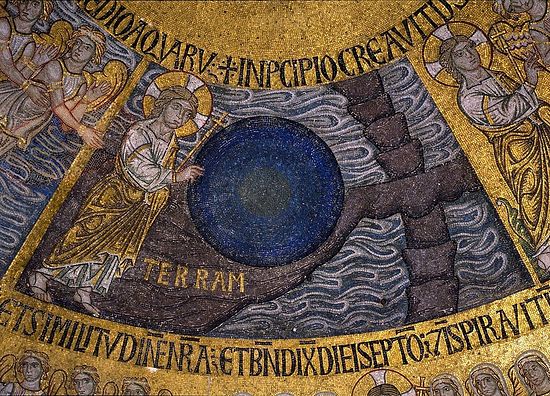 Creation of Earth (Creation of the World, fragment) St. Mark’s Basilica, Venice, Italy. 13th century.
Creation of Earth (Creation of the World, fragment) St. Mark’s Basilica, Venice, Italy. 13th century. They would say, “If the history of Earth is not long enough to explain the origin of life, we’ll come up with something new.”
Andrey Vetchinkin: My distant ancestors were Old Believers, so when I was young I read the history of the Old Belief based on the materials of Melnikov-Pechorsky’s committee. And I was baffled by the number of sects they had! In the nineteenth century, there was even a saying that went: “Every province has a doctrine, every village has a movement, and every woman has a different interpretation.” Just look at how many sects of various sizes, various interpretations, and absolutely horrific rituals came to be, only because people turned away from the Church and started thinking in their own way! Moreover, they also began dividing into smaller groups. The same thing is happening with evolutionists. I think it will be increasingly more difficult to conceal the inconsistency of the evolutionary paradigm. “Well then,” they would say. “Let us come up with another paradigm. If the history of Earth is not long enough to explain the origin of life, let us develop a theory of panspermia claiming that life was brought from other planets that formed billions of years ago and that aliens brought it to Earth.” Anything can be invented.
Father George: Some people do say something like that.
Andrey Vetchinkin: I can come up with any number of theories like that, but they would be superficial, without any real foundation. They would be based on nothing but fantasies. These would be mere claims without any evidence. Unfortunately, Orthodox apologists don’t always have a scientific background, and their books are either unsubstantiated or contain scientific errors that evolutionists are quick to notice and, so, they say, “because there are mistakes here and there, therefore the entire hypothesis is wrong.” There are very few serious scientists who consistently support the creationist views. I know of only two or three of them.
Father George: Some are afraid to publicize their views.
Andrey Vetchinkin: Yes, I meant the ones who are not afraid. Those who completed research and published their results.
Father George: There are even academicians who understand the inconsistency of the theory of evolution, but do not dare to admit it in the academic circles, in order that they might not gain the reputation of an odd man out.
Andrey Vetchinkin: I tried to talk to foreign scientists, but they only nodded their heads politely, not showing any particular emotions.
Father George: I know a creationist biochemist who talked online with an evolutionist about abiogenesis and basically proved that abiogenesis was not possible.9 In the end, the evolutionist said, “Yes, you correctly identified the weakness of all theories of abiogenesis. Can you offer a better theory?” So, the creationist said, “Here’s a better theory: God created everything.” But scientists cannot accept this.
Andrey Vetchinkin: There are people who understand all of this and yet it does not bother them. They say, “I don’t feel that anything is wrong, so let’s be logical and think of something better.” So, unfortunately, there are problems that still need to be resolved.
Father George: Andrey Sergeevich, thank you very much for your story. I hope to God that everybody who cares about the truth would be as determined on their journey as you are.

